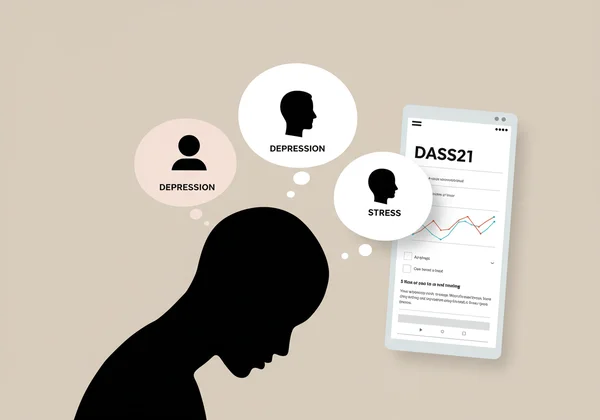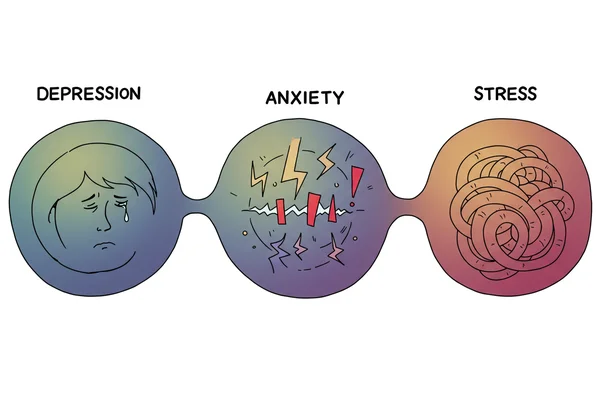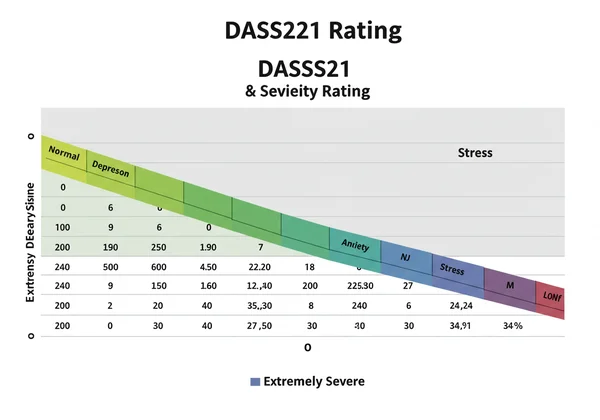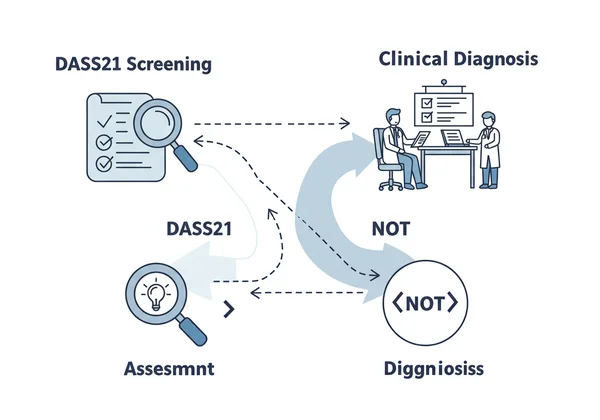DASS21:問卷結構與計分說明
July 27, 2025 | By Evelyn Reed
您是否曾經感到不知所措,卻又無法確切分辨那是壓力、焦慮,還是更接近憂鬱?您並不孤單。了解我們的情緒狀態是邁向更好心理健康的起步,但這可能是一項複雜的任務。這時候,一個強大的自我評估工具 DASS21 就派上用場了。那麼,什麼是 DASS21 測驗? 它是一份科學設計的問卷,旨在幫助您衡量過去一週在憂鬱、焦慮和壓力方面的經歷,提供您情緒健康的清晰、私密且富有洞察力的快照。
在本指南中,我們將深入探討 DASS21 的框架,剖析其問題結構並簡化計分系統。您將會發現為何這項工具受到數百萬人信賴,並獲得有效解讀您結果的信心,從而賦予您掌握自己情緒健康的力量。想親自體驗嗎?您可以立即 進行免費評估。
什麼是 DASS21 問卷?基礎概覽
DASS21 問卷 是一項廣泛認可的心理篩檢工具。它是研究人員 S.H. Lovibond 和 P.F. Lovibond 開發的原版 42 題憂鬱、焦慮與壓力量表 (DASS) 的簡化版本。其目的並非用於診斷,而是衡量憂鬱、焦慮和壓力常見核心症狀的嚴重程度。這使得您可以在家中舒適地快速、可靠地了解自己的情緒狀態。
這份測驗包含 21 個簡單的問題,每個問題都要求您根據過去一週的適用程度對特定陳述進行評分。DASS21 的優勢在於它能夠解析這些經常重疊的負面情緒狀態,為您提供每個獨立的分數。這種清晰度對於任何希望更精確地了解自己感受的人來說都至關重要。

21 個問題:探討各次量表的重點
儘管這些問題看似簡單,但它們經過精心設計,旨在針對特定症狀。這 21 個項目分為三個次量表,每個次量表有七個問題,專注於評估的核心面向。
- 憂鬱次量表: 這些問題著重於持續的情緒低落、失去興趣或樂趣(快感缺乏)、無價值感以及對未來的絕望感等症狀。它們衡量您的自我貶低和慣性程度。
- 焦慮次量表: 這組問題評估您經歷的生理激動,例如心悸或口乾,以及主觀的恐懼和擔憂感。它衡量您在恐慌樣症狀和情境性焦慮方面所受到的影響程度。
- 壓力次量表: 壓力問題評估您持續緊張、易怒和難以放鬆的程度。此次量表有助於識別您是否感到過度反應、容易煩躁或緊繃。
透過完成這些 自我評估問題,您可以為您的情緒健康建立一個多面向的圖像。
憂鬱、焦慮、壓力:區分核心面向
DASS21 的一個關鍵優勢在於它能夠區分這三種 獨特的情緒狀態。儘管它們經常同時出現,但它們並不相同。了解差異至關重要。
- 憂鬱 主要特徵是失去樂趣和對生活的悲觀看法。它是一種低正面情緒的狀態。
- 焦慮 的特徵是預感危險和生理過度活躍。這是一種感覺壞事可能會發生的感覺,伴隨著身體的戰鬥或逃跑反應。
- 壓力 是一種神經緊張和易怒的狀態。它反映了一種不知所措、無法應對壓力的感覺。
DASS21 幫助您了解 症狀群集 中哪種對您最顯著,這可以引導您採取更有針對性的應對策略。準備好 檢查您的水平 了嗎?

DASS21 計分揭密:您的分數如何計算
使用者最常問的問題之一是關於 DASS 21 計分。了解您的回應如何轉化為有意義的結果,對於建立信任和清晰度至關重要。此計算旨在簡單明瞭。了解您的答案如何轉化為有意義的見解,可以加深您的理解,因為這是一個簡單的兩步驟過程。
在我們的平台,此計算會即時自動進行,但了解其背後的機制可以加深您對結果的理解。您可以 開始您的 DASS21 測驗 來實際操作。
原始分數與最終分數:計算方法
計分系統 在您回答完 21 個問題後立即開始。每個問題均根據 4 點頻率量表進行評分:
- 0 = 完全不適用於我
- 1 = 在某種程度上適用於我,或適用於我一段時間
- 2 = 在很大程度上適用於我,或適用於我大部分時間
- 3 = 非常適用於我,或適用於我大部分時間
首先,系統會加總三個次量表(憂鬱、焦慮和壓力)中七個問題的分數。這會給您三個獨立的「原始分數」。然而,由於 DASS21 是較完整的 DASS42 的簡化版本,因此必須將這些原始分數乘以 2,使其能與原始、更全面的量表進行比較。因此,簡單的公式是:最終分數 = 原始分數 x 2。此方法可確保您的結果與既定的臨床和研究標準一致。
了解嚴重程度等級:從正常到極度嚴重
當您 計算結果 後,憂鬱、焦慮和壓力的最終分數將與既定的 嚴重程度等級 進行比較。這些等級提供了背景資訊,幫助您了解您的分數落在正常到極度嚴重之間的哪個範圍。
以下是標準的 DASS21 嚴重程度等級:
憂鬱分數:
- 正常: 0-9
- 輕度: 10-13
- 中度: 14-20
- 嚴重: 21-27
- 極度嚴重: 28+
焦慮分數:
- 正常: 0-7
- 輕度: 8-9
- 中度: 10-14
- 嚴重: 15-19
- 極度嚴重: 20+
壓力分數:
- 正常: 0-14
- 輕度: 15-18
- 中度: 19-25
- 嚴重: 26-33
- 極度嚴重: 34+
請記住,這些等級是幫助 分數解讀 的指南。它們並非您心理健康的最終判決,而是您當前情緒狀態的有用指標。

DASS21 量表:可靠性、效度和科學依據
在使用任何心理工具時,人們自然會想知道它的可信度。DASS 21 量表 並非隨機測驗;它是一份經過科學驗證的工具,有數十年的研究支持。它的可靠性和效度使其成為個人、研究人員甚至臨床專業人士進行初步篩檢的信任工具。
了解其科學基礎可以讓您對收到的結果感到安心。它旨在提供負面情緒症狀的一致且準確的衡量,使其成為您自我認知之旅的可靠盟友。
為何 DASS21 是值得信賴的自我評估工具
DASS21 在全球受到尊重,是因為它具有強大的 心理計量特性。它顯示了高內部一致性,這意味著其次量表中的問題能夠可靠地衡量相同的潛在概念(憂鬱、焦慮或壓力)。此外,其效度已在眾多研究中得到證實,表明它能夠準確衡量它所聲稱衡量的內容。
這種科學嚴謹性確保當您進行 DASS21 時,您收到的回饋是基於穩固、循證的框架。它是一種可靠的自我檢查方式,提供有意義且植根於心理科學的見解。我們網站上的 免費 DASS21 測驗 使用此經過驗證的量表來提供可靠的結果。
誰可以使用 DASS21 及其限制
DASS21 專為 17 歲及以上的成人和青少年設計。它是一個多功能的工具,可供廣泛的個人使用,包括:
- 自我照護者 追蹤他們的情緒波動。
- 學生 探索心理學概念或應對學術壓力。
- 專業人士 將其作為與客戶或員工進行初步篩檢的輔助工具。
然而,絕對有必要了解其主要限制:DASS21 是一個篩檢工具,而非診斷工具。 它可以突出潛在的關注領域,但不能也不應被用來診斷臨床疾病。正式診斷只能由合格的醫療保健專業人員,例如心理學家、精神科醫生或全科醫生,在進行全面評估後提供。

運用 DASS21 知識賦予您力量
透過清晰掌握 DASS21 的設計、計分和科學基礎,您現在可以真正利用這項工具進行有力的自我反思。它不僅僅是一份問卷;它是一扇窗戶,讓您了解憂鬱、焦慮和壓力可能如何影響您,並提供您情緒狀態的可靠、循證衡量。這種新獲得的清晰度是您掌控心理健康之旅的重要一步。
邁向情緒健康的每一步都很重要。運用從 DASS21 獲得的見解來指導您的道路。準備好邁出下一步了嗎?立即試試我們免費、保密且即時的評估。在您的分數之外,您還可以選擇個性化 AI 報告,提供更深入的指導。 立即發現您的結果,開啟自我認知的全新篇章。
關於 DASS21 量表的常見問題
DASS21 測驗用於什麼?
DASS21 測驗用於自我評估篩檢,以衡量過去一週與憂鬱、焦慮和壓力相關症狀的嚴重程度。它有助於個人快速清晰地了解他們當前的情緒狀態,但不用於臨床診斷。
我該如何解讀我的 DASS21 分數?
您可以將您的分數與每個次量表的嚴重程度等級表(正常、輕度、中度、嚴重、極度嚴重)進行比較來解讀。為了獲得更深入的理解,我們的平台提供可選的 AI 驅動個性化報告,解釋您的分數的意義並提供可行的建議。為了獲得完整的畫面,請與心理健康專業人士討論您的結果。
DASS21 是診斷工具嗎?
不是。這是一個關鍵點。DASS21 是一個篩檢工具,用於顯示您可能經歷的情緒困擾程度。它無法診斷臨床憂鬱或焦慮症等疾病。務必諮詢醫療保健提供者以獲得正式診斷。
DASS21 的「正常」分數是多少?
「正常」分數表示情緒困擾程度低。範圍為:憂鬱 0-9,焦慮 0-7,壓力 0-14。落在這些範圍內表示根據您的回應,您在過去一週經歷的症狀很少。
我可以免費且保密地進行 DASS21 測驗嗎?
當然可以。在我們平台上進行測驗完全免費、私密且無需註冊。我們致力於保護您的隱私,您的回應和結果均為保密。您可以 立即試用我們的免費工具,並獲得即時、安全的 15 種以上語言的回饋。